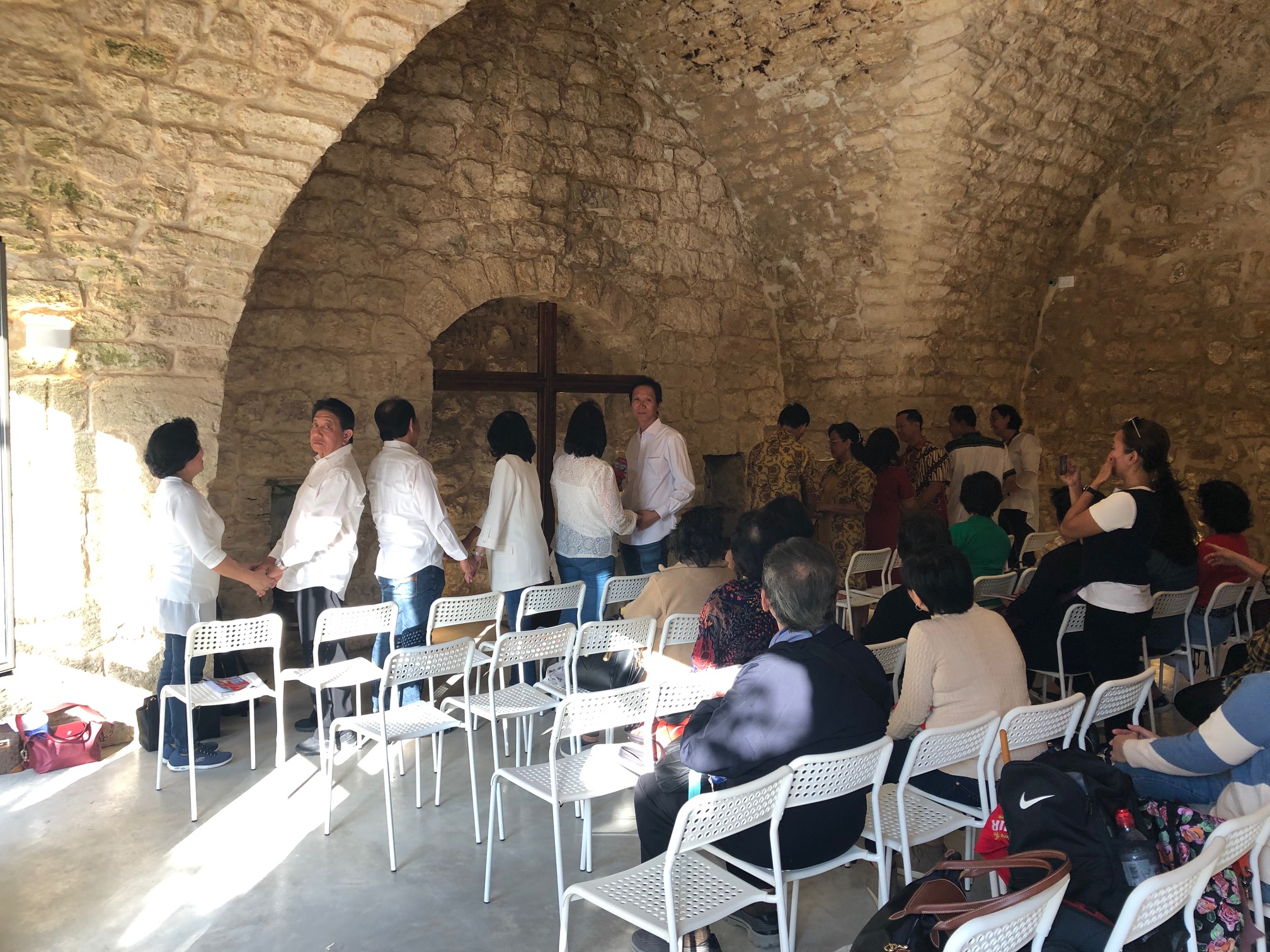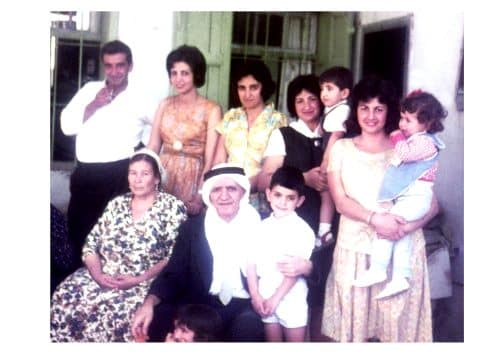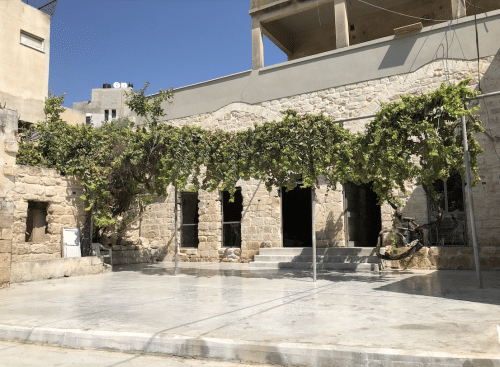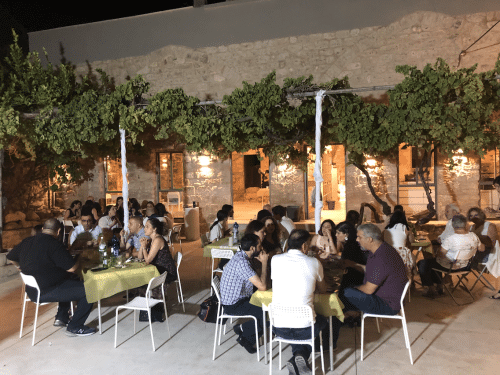
Previous Palestinian prisoner received BA degree while in Israeli prison

My maternal grandparents lived in the nearby village of Cana of Galilee, a few miles to the northeast of my hometown Nazareth. My grandfather (Nayif) was a police officer during the British mandate on Palestine. I was five years old when he died so I have very few memories of him, but I was told he was an impressive Greek Orthodox Palestinian generous man and very respected in town. His wife Mariam, my grandmother who died 15 years after him, was an educated woman – a rare commodity in those days. She spoke and wrote Arabic and English as well as some Turkish.
They had five children: four girls and one boy. Three girls were married (my mom was the youngest).

Nayif and Mariam’s family with their children and few grandchildren in 1964.
At first, Nayif and Mariam and the growing family lived in a typical big arch-shaped and high-ceiling room. Nayif’s job and good income enabled him to buy the adjacent similar room from his cousin. The house had a nice large courtyard in front of it covered with a beautiful vine.
As a child, I remember that we would meet our cousins at our grandparent’s home almost weekly. My grandmother and aunt would work relentlessly to feed us. My uncle would examine us with riddles while my dad would cut the bad branches of the vine trees. Most of the time we would play hide-and-seek in the neighborhood and watch the rabbits in the backyard or explore the contents of the unfinished building structure on the second floor.
These encounters in Sedo’s (“grandfathers” in Arabic) home gave flavour to my childhood. That 140-year-old house symbolizes our rich Palestinian Christian heritage. Our memories are cherished to this day and they shaped us.
The last inhabitant of the house (my aunt Salwa) moved out to an assisted living home (and passed away a few years later) ten years ago. As an ancient unlived house, its condition deteriorated and that house became in a miserable condition and had to be sealed.
One day in 2018, my sister Samar and her Jordanian husband Rajai called us and said that they wanted to meet urgently. Rajai, an evangelical pastor and tour leader, led a group of pilgrims in Cana of Galilee who had just performed a vow renewal ceremony at the nearby crowded Catholic church, which lies a hundred yards away from the abandoned house of our grandparents’ home.
When we met him that evening, Rajai put on the table a proposal to bring to life this house. He suggested we renovate it and open it to visitors who can have a meaningful experience of renewal of vows or even marriage ceremony in the home as well as any forms of celebration afterward in the courtyard.
How can you reject such an offer?
The proposal seemed plausible considering the huge numbers of Christian tourists who visit Israel. It was difficult to reject the offer to renovate this amazing house located in the old part of the Biblical Cana of Galilee. The idea of reviving our grandparents’ house and keeping the heritage alive excited all of us. That was due to the fact that this old house can be instrumental to bless visitors of Cana who yearn to enhance their marriage in the town that Jesus blessed a wedding in.
Our deliberations did not last long. We joined in. We met with the other heirs that owned the house today. They were delighted and gave their full blessing. We agreed that my sister would manage the new structure which would be dedicated to giving tourists an opportunity to renew their wedding vows as well as providing for any local newlyweds who want to tie the knot in the town where Jesus turned water into wine performing his first miracle in Galilee.

What the 140-year-old house looks like today.
We invested in the renovation of this home and put it back in its original shape. We also upgraded the small rooms that were bought by my mom and her sisters on the eastern side of the compound to create office space, kitchen, and bathrooms.
We called the renewed house “Cana Wedding Chapel” and we had a soft opening opened in November 2019, which is traditionally at the end of the tourism season.
We waited patiently and hoped that by the spring season tourism the flow. In the meantime, groups started booking for the following months and few arrived in the off-season. They enjoyed the place and had a meaningful and spiritual experience. We also had the support of the local city council that choose the Cana Wedding Chapel to host a meeting with the general director of the ministry of tourism who visited Cana in late January 2020.
However, in early March 2020, instead of a flow of visitors, we got cancellations due to the COVID-19 pandemic that hit the world.
Sedo’s home was deserted again. After a lockdown would end we would clean the floor to remove the weeds that would then grow again in the same place.
It was frustrating since the government subsidy and compensation we got were minimal. New businesses like Cana Wedding Chapel are without saved income to refer to whenever government compensation is considered.

Cana Wedding Chapel
This year, though and with the slowdown of the pandemic, we are hopeful that our vision of creating this center will do more than just provide another touristic site to visitors. We hope and pray that we can make the visit to my grandparent’s beautiful home a unique experience. As Christian believers living the stories of the Bible, our family is excited to contribute to an authentic experience for our many fellow Christians from around the world who want to follow in the footsteps of our Lord. As Palestinian citizens of Israel, though, we cannot ignore the suffering and the absence of peace and justice in our homeland and the region.
We are not interested in having a business or simply providing our grandparent’s home to be part of a museum of sorts. We want to be the living stones that can make a worthy contribution to all that visit the biblical Cana of Galilee.
We hope and pray that our new Cana Wedding Chapel can contribute in a small way to spiritual experiences and at the same time allow pilgrims to the Holy Land to meet and engage with our community, which has chosen to be part of the living stones of this biblical land.
Botrus Mansour is a lawyer, writer, school administrator, and evangelical church leader.
republished from Word & way


تكافح مجلة “ملح الأرض” من أجل الاستمرار في نشر تقارير تعرض أحوال المسيحيين العرب في الأردن وفلسطين ومناطق الجليل، ونحرص على تقديم مواضيع تزوّد قراءنا بمعلومات مفيدة لهم ، بالاعتماد على مصادر موثوقة، كما تركّز معظم اهتمامها على البحث عن التحديات التي تواجه المكون المسيحي في بلادنا، لنبقى كما نحن دائماً صوت مسيحي وطني حر يحترم رجال الدين وكنائسنا ولكن يرفض احتكار الحقيقة ويبحث عنها تماشيًا مع قول السيد المسيح و تعرفون الحق والحق يحرركم
من مبادئنا حرية التعبير للعلمانيين بصورة تكميلية لرأي الإكليروس الذي نحترمه. كما نؤيد بدون خجل الدعوة الكتابية للمساواة في أمور هامة مثل الإرث للمسيحيين وأهمية التوعية وتقديم النصح للمقبلين على الزواج وندعم العمل الاجتماعي ونشطاء المجتمع المدني المسيحيين و نحاول أن نسلط الضوء على قصص النجاح غير ناسيين من هم بحاجة للمساعدة الإنسانية والصحية والنفسية وغيرها.
والسبيل الوحيد للخروج من هذا الوضع هو بالتواصل والنقاش الحر، حول هويّاتنا وحول التغييرات التي نريدها في مجتمعاتنا، من أجل أن نفهم بشكل أفضل القوى التي تؤثّر في مجتمعاتنا،.
تستمر ملح الأرض في تشكيل مساحة افتراضية تُطرح فيها الأفكار بحرّية لتشكل ملاذاً مؤقتاً لنا بينما تبقى المساحات الحقيقية في ساحاتنا وشوارعنا بعيدة المنال.
كل مساهماتكم تُدفع لكتّابنا، وهم شباب وشابات يتحدّون المخاطر ليرووا قصصنا.